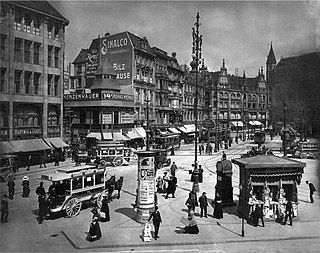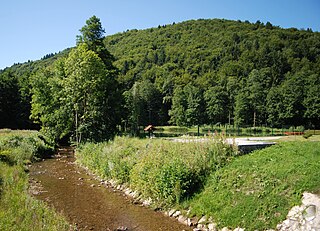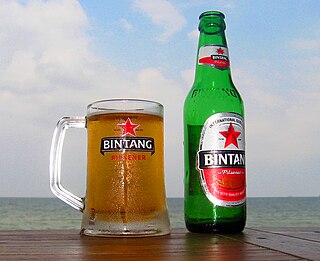
An alcopop is any of certain mixed alcoholic beverages with relatively low alcohol content, including:
- Malt beverages to which various fruit juices or other flavorings have been added
- Wine coolers: beverages containing wine to which ingredients such as fruit juice or other flavorings have been added
- Mixed drinks containing distilled alcohol and sweet liquids such as fruit juices or other flavourings

Low-alcohol beer is beer with little or no alcohol by volume that aims to reproduce the taste of beer while eliminating or reducing the inebriating effect, carbohydrates, and calories of regular alcoholic brews. Low-alcohol beers can come in different beer styles such as lagers, stouts, and ales. Low-alcohol beer is also known as light beer, non-alcoholic beer, small beer, small ale, or near-beer.

A soft drink is any water-based flavored drink, usually but not necessarily carbonated, and typically including added sweetener. Flavors used can be natural or artificial. The sweetener may be a sugar, high-fructose corn syrup, fruit juice, a sugar substitute, or some combination of these. Soft drinks may also contain caffeine, colorings, preservatives and other ingredients.

An energy drink is a type of functional beverage containing stimulant compounds, usually caffeine, which is marketed as providing mental and physical stimulation. They may or may not be carbonated and may also contain sugar, other sweeteners, or herbal extracts, among numerous other possible ingredients.

Arak or araq is a distilled Levantine spirit of the anise drinks family. It is translucent and unsweetened.

In the United Kingdom, a tied house is a public house required to buy at least some of its beer from a particular brewery or pub company. That is in contrast to a free house, which is able to choose the beers it stocks freely.

The Texas Alcoholic Beverage Commission, or TABC, is a Texas public agency responsible for regulating, inspecting, and taxing the production, sale, and use of alcoholic beverages within the state. The agency was established in 1935 and is headquartered in Austin.

Sinalco is a German brand of non-alcoholic drinks first marketed in 1902, with sales in now more than 40 countries. Sinalco is the oldest soft drink brand in Europe. It is produced by Sinalco International, a company headquartered in Detmold, Germany.

Four Loko is a line of alcoholic beverages sold by Phusion Projects of Chicago, Illinois, United States. Four Loko's recipe formerly included caffeine. Phusion operates as Drink Four Brewing Company. Four Loko, the company's most popular beverage, debuted in the United States market in 2005 and is available in 49 states, and in 21 countries including Ecuador, Guatemala, Paraguay, The Bahamas, Peru, Mexico, Colombia, Bolivia, Honduras, El Salvador, Nicaragua, Costa Rica, China, Canada and some countries in Europe. The name "Four" is derived from the original drink having four "key ingredients".

A liquor license is a governmentally issued permit for businesses to sell, manufacture, store, or otherwise use alcoholic beverages.

The Mirna is a river in southeastern Slovenia. The river is a right tributary of the Sava River in the province of Lower Carniola. It is 44 kilometers (27 mi) long, starts below the settlement of Velika Preska, flows through the Mirna Valley and joins the Sava at Dolenji Boštanj, opposite Sevnica.

A drinking establishment is a business whose primary function is the serving of alcoholic beverages for consumption on the premises. Some establishments may also serve food, or have entertainment, but their main purpose is to serve alcoholic beverages. There are different types of drinking establishment ranging from seedy bars or nightclubs, sometimes termed "dive bars", to 5,000 seat beer halls and elegant places of entertainment for the elite. A public house, informally known as a "pub", is an establishment licensed to serve alcoholic drinks for consumption on the premises in countries and regions of British influence. Although the terms are increasingly used to refer to the same thing, there is a difference between pubs, bars, inns, taverns and lounges where alcohol is served commercially. A tavern or pot-house is, loosely, a place of business where people gather to drink alcoholic beverages and, more than likely, also be served food, though not licensed to put up guests. The word derives from the Latin taberna and the Greek ταβέρνα/taverna.

Alcohol laws are laws relating to manufacture, use, being under the influence of and sale of alcohol or alcoholic beverages. Common alcoholic beverages include beer, wine, (hard) cider, and distilled spirits. Definition of alcoholic beverage varies internationally, e.g., the United States defines an alcoholic beverage as "any beverage in liquid form which contains not less than one-half of one percent of alcohol by volume". Alcohol laws can restrict those who can produce alcohol, those who can buy it, when one can buy it, labelling and advertising, the types of alcoholic beverage that can be sold, where one can consume it, what activities are prohibited while intoxicated, and where one can buy it. In some cases, laws have even prohibited the use and sale of alcohol entirely.

Mirna is a nucleated village and a minor economic centre in central Lower Carniola, Slovenia. It is the largest settlement of the Mirna Valley and the seat of the Municipality of Mirna. It is situated at the crossing of regional roads and a confluence of several creeks with the Mirna River, along the railway line linking Sevnica and Trebnje.

A caffeinated alcoholic drink is a drink that contains both alcohol and a significant amount of caffeine. Caffeine, a stimulant, masks some of the depressant effects of alcohol. However, in 2010 and 2011, this type of drink faced criticism for posing health risks to its drinkers. In some places there is a ban on caffeinated alcoholic drinks.

The Municipality of Mirna is a municipality in the traditional region of Lower Carniola in southeastern Slovenia. The seat of the municipality is the town of Mirna. Mirna became a municipality in 2011.

Alcohol in Indonesia refers to the alcohol industry, alcohol consumption and laws related to alcohol in the South East Asian country of Indonesia. Indonesia is a Muslim majority country, yet it is also a pluralist, democratic and secular nation. These social and demographic conditions led to Islamic parties and pressure groups pushing the government to restrict alcohol consumption and trade, while the government carefully considers the rights of non-Muslims and consenting adults to consume alcohol, and estimates the possible alcohol ban effects on Indonesian tourism and the economy.

Barbican is a brand of non-alcoholic malt drinks distributed by the Aujan Coca-Cola Beverages Company (ACCBC). The drink is primarily sold in the Middle East and North Africa.



















